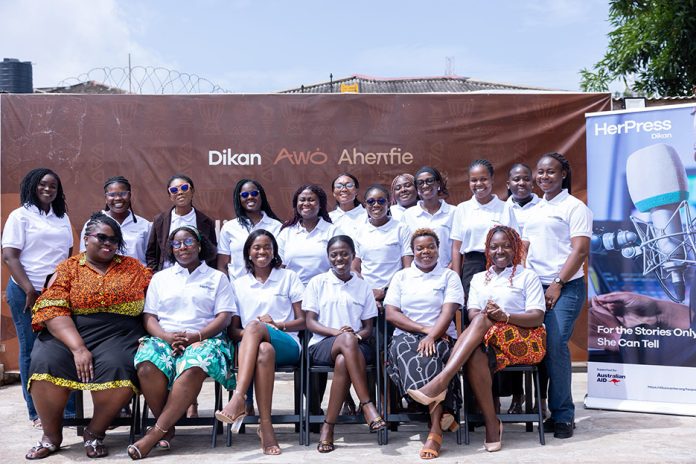A bold initiative to close gender gaps in media leadership and representation has been launched in Accra, with the unveiling of HerPress Journalism fellowship.
The pioneering programme, spearheaded by the Dikan Centre and supported by the Australian High Commission, is designed to address the persistent challenges women face in Ghana’s media industry, including workplace harassment, unequal pay, and limited career advancement.
Through an intensive three-month course, HerPress will equip 20 female journalists at a time with skills in advanced reporting, digital storytelling, safety protocols and leadership development.
Participants will receive mentorship and hands-on training in investigative journalism, while being guided through strategies to confront and overcome structural barriers in the profession. The broader goal is to create a pipeline of women leaders who will transform newsrooms into more inclusive and equitable spaces and promote balanced and diverse reporting across the country.
Speaking at the launch, Ewurama Bennin, Programme Manager of the Central Leadership Programme underscored the importance of internal empowerment in the journey toward gender equality.
She urged women to overcome self-doubt and societal limitations, describing the fight for equality as a battle against the “enemy within.”
She introduced three pillars essential for personal transformation: self-awareness, understanding how one’s experiences shape identity and practicing self-love through complete self-acceptance. “Actions speaks louder than words, and your actions will make your voice heard,” she said, encouraging strategic self-advocacy over passive expectation.
Australian High Commissioner to Ghana, Berenice Owen-Jones, reaffirmed her country’s commitment to advancing gender equality and media freedom across Africa.
She stressed that empowering women journalists goes beyond individual progress it promotes transparency and strengthens democratic governance.
“When women’s voices are amplified, governance is more transparent, and when women journalists are empowered, the truth is more likely to be told,” she noted.
Ms Owen-Jones drew attention to the stark underrepresentation of women in African media, citing research that shows women make up only 22 per cent of news sources across the continent and hold just six per cent of executive positions in Ghanaian media organisations.
She added that the HerPress initiative is a direct intervention to bridge these gaps through focused professional development.
The High Commissioner also expressed concern over the threats that frequently silence women journalists from gender-based harassment to structural discrimination and how such threats lead to self-censorship and undermine diversity in media narratives.
Founder and Executive Director of the Dikan Centre, Paul Ninson, highlighted the transformational role of journalism in society and the critical need to embrace the perspectives of women to achieve that mission. “Journalism is not just about reporting facts but about capturing the fullness of human experiences,” he said.
Mr Ninson lamented how systemic issues such as undervaluing women’s contributions, marginalisation, and sexual harassment prevent journalism from fulfilling its true role. “When women’s contributions to storytelling are sidelined, journalism loses its power to reflect reality,” he stressed.
According to him, HerPress is not just about training journalists, but about redefining the purpose of journalism — to inform, inspire, and catalyse social change.









